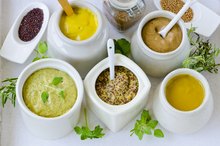The Advantages of Celery With Peanut Butter
Celery with peanut butter is the traditional base of “ants on a log,” a classic children’s snack that provides a hefty dose of nutrition and creativity. But far from being just for children, celery and peanut butter is a combination that has a range of health benefits for people of all ages.
Balance
Eating celery with peanut butter provides a balance of all three essential nutrients: protein, carbohydrates and fat. While celery has almost no protein or healthy fats, peanut butter has both. According to the USDA, one large stalk of celery has just 10 calories, 0.5 g protein, no fat, 2 g carbohydrates, 1 g fiber and 1 g natural sugar. Two tablespoons of smooth peanut butter have 190 calories, 8 g protein, 16 g fat, 6 g carbohydrates, 2 g fiber and 3 g sugar. Of the 16 g fat in the peanut butter, 3 g are saturated.
- Eating celery with peanut butter provides a balance of all three essential nutrients: protein, carbohydrates and fat.
- According to the USDA, one large stalk of celery has just 10 calories, 0.5 g protein, no fat, 2 g carbohydrates, 1 g fiber and 1 g natural sugar.
Satiety
How Many Calories in Carrot Sticks?
Learn More
Celery and peanut butter both have qualities that encourage feelings of satiety, which makes them an ideal snack if you’re watching your weight. Celery has a relatively high amount of fiber per serving, and fiber-rich foods tend to take longer to chew and digest. Peanut butter, alternately, has enough protein and healthy fat to promote lasting satiety, according to University of Nebraska registered dietitian Alice Henneman. In fact, according to 2003 research published in the “European Journal of Clinical Nutrition,” increased nut consumption was associated with decreased body mass index 2.
- Celery and peanut butter both have qualities that encourage feelings of satiety, which makes them an ideal snack if you’re watching your weight.
- Peanut butter, alternately, has enough protein and healthy fat to promote lasting satiety, according to University of Nebraska registered dietitian Alice Henneman.
Heart Health
Snacking on peanut butter and celery may also improve cardiovascular risk factors. According to ChooseMyPlate.gov, fiber-rich veggies such as celery have the potential to reduce blood cholesterol levels and heart disease risk. Nuts have heart-healthy unsaturated fats, the type of fats that lower LDL cholesterol, lessen the risk of blood clots and make the linings of your arteries healthier.
Vitamins and Minerals
Nutritional Value of Carrots and Celery
Learn More
Providing a balanced package of protein, carbs and fat isn’t the only nutritional advantage that peanut butter and celery can offer. According to the USDA National Nutrient database, celery contains vitamins A, B, C and E and the minerals calcium, magnesium, phosphorus, potassium and sodium. When you cook the veggie, it loses much of its vitamin B and E, so eating it raw with peanut butter provides a definite advantage. The American Peanut Council adds that peanut butter is a valuable source of folate, vitamin E, niacin, thiamine, riboflavin and vitamin B-6.
- Providing a balanced package of protein, carbs and fat isn’t the only nutritional advantage that peanut butter and celery can offer.
- The American Peanut Council adds that peanut butter is a valuable source of folate, vitamin E, niacin, thiamine, riboflavin and vitamin B-6.
Related Articles
References
- Lancaster.UNL.edu; Nuts for Nutrition; Alice Henneman, R.D.
- "European Journal of Clinical Nutrition"; Nut Consumption, Body Weight and Insulin Resistance; P Garcia-Lorda; 2003
- Guasch-Ferré M, Liu X, Malik VS, et al. Nut consumption and risk of cardiovascular disease. J Am Coll Cardiol. 2017;70(20):2519–2532. doi:10.1016/j.jacc.2017.09.035
- Bes-Rastrolio, M.; Wedick, N.; Martinez-Gonzalez, M. et al. Prospective study of nut consumption, long-term weight change, and obesity risk in women. Am J Clin Nutr. 2009 Jun;89(6):1913-9. DOI: 10.3945/ajcn.2008.27276
- Bonnefont-Rousselot, D. Resveratrol and cardiovascular diseases. Nutrients. 2016 May;8(5):250. DOI: 10.3390/nu8050250
- American Academy of Allergy, Asthma, and Immunology (AAAAI). Newly Issued Clinical Guidelines from NIAID Recommend Early Peanut Intervention, Not Avoidance. Milwaukie, Wisconsin: AAAAI; issued January 5, 2017.
Writer Bio
Carly Schuna is a Wisconsin-based professional writer, editor and copy editor/proofreader. She has worked with hundreds of pieces of fiction, nonfiction, children's literature, feature stories and corporate content. Her expertise on food, cooking, nutrition and fitness information comes from a Level 1 personal training certification and years of in-depth study.








